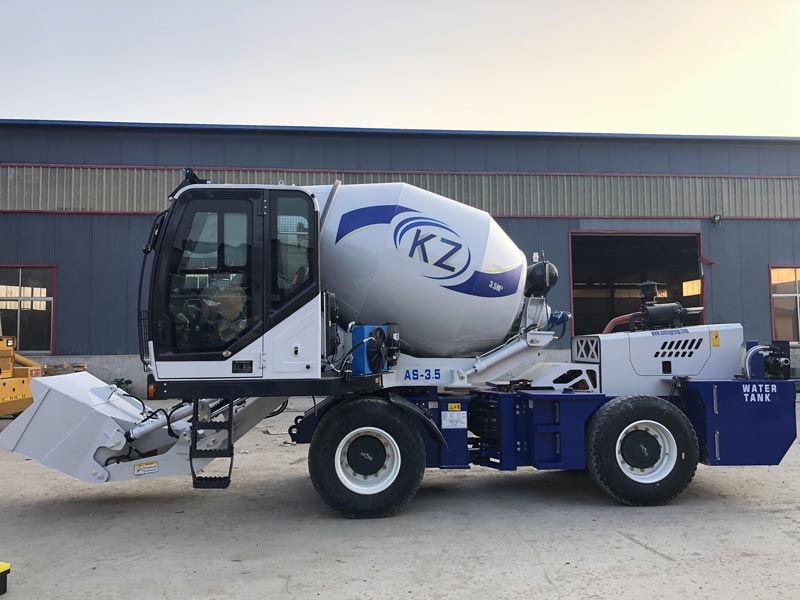What Are the Causes of Premature Engine Damage in a Self-Loading Concrete Mixer?
- aimixglobal2024
- 2025年1月19日
- 讀畢需時 3 分鐘
Self-loading concrete mixers are vital in construction. They streamline the concrete mixing process and improve efficiency. However, premature engine damage in these machines can lead to costly repairs and project delays. Understanding the causes of engine damage can help prevent these issues. This article explores the common causes of premature engine damage in self-loading concrete mixers.

Inadequate Maintenance
Inadequate maintenance is a significant cause of engine damage.
Irregular Oil Changes
Regular oil changes are crucial for engine health. Dirty oil increases friction and wear on engine parts. Following the manufacturer's oil change schedule helps prevent engine damage.
Neglecting Filter Replacements
Filters keep the engine clean by trapping contaminants. Neglecting filter replacements allows dirt and debris to enter the engine. Regularly replacing air, fuel, and oil filters ensures the engine stays clean and functions properly.
Ignoring Warning Signs
Ignoring warning signs like unusual noises or warning lights can lead to severe engine damage. Address these signs promptly to prevent further issues. Regular inspections and timely repairs are essential for engine longevity.
Click here you can learn more information about the maintenance of self loading concrete mixers.
Poor Quality Fuel
Using poor quality fuel can cause significant engine damage.
Contaminated Fuel
Contaminated fuel introduces dirt and debris into the engine. This can cause blockages and damage engine components. Use high-quality fuel and ensure proper storage to prevent contamination.
Incorrect Fuel Type
Using the incorrect fuel type harms the engine. Always use the fuel type recommended by the manufacturer. This ensures the engine runs efficiently and reduces the risk of damage.
Water in Fuel
Water in the fuel causes corrosion and damages the engine. Ensure fuel storage tanks are sealed and free from water. Regularly check for water contamination and take steps to remove it.

Overloading and Overworking
Overloading and overworking the mixer can strain the engine.
Exceeding Load Capacity
Exceeding the recommended load capacity puts extra strain on the engine. This can lead to overheating and damage. Follow the manufacturer's load capacity guidelines to ensure safe engine operation.
Continuous Operation Without Breaks
Continuous operation without breaks can cause the engine to overheat. Allowing the engine to cool down during breaks helps prevent overheating. Proper work schedules and breaks are essential for engine health.
High RPM Operation
Operating the engine at high RPMs for extended periods causes excessive wear. Maintain a moderate RPM range to ensure efficient engine operation and reduce the risk of damage.
Environmental Factors
Environmental factors can also contribute to premature engine damage.
Extreme Temperatures
Extreme temperatures affect engine performance. High temperatures cause overheating, while low temperatures make it difficult for the engine to start. Use appropriate engine coolants and warm-up procedures to mitigate these effects.
Dust and Debris
Dust and debris entering the engine cause damage. Operating in dusty environments requires extra precautions. Use protective covers and regularly clean the engine to prevent damage.
Humidity and Moisture
High humidity and moisture cause corrosion and rust in the engine. Ensure proper storage and use anti-corrosion treatments to protect the engine from moisture-related damage.
Poor Operating Practices
Poor operating practices can lead to premature engine damage.
Hard Acceleration and Braking
Frequent hard acceleration and braking strain the engine. Smooth and steady driving practices reduce wear and tear on the engine. Train operators on proper driving techniques to preserve engine health.
Ignoring Regular Service Intervals
Skipping regular service intervals leads to unnoticed issues. Follow the manufacturer's service schedule to address potential issues promptly. Regular servicing is essential for maintaining engine health.
Improper Warm-Up Procedures
Starting the engine and immediately operating at full capacity causes damage. Allow the engine to warm up gradually to ensure proper lubrication and reduce wear. Proper warm-up procedures are crucial for engine longevity.
Conclusion
Premature engine damage in a self-loading concrete mixer can be caused by several factors. Inadequate maintenance practices, including irregular oil changes, neglecting filter replacements, and ignoring warning signs, are common causes. Using poor quality fuel, such as contaminated fuel or the incorrect fuel type, also damages the engine.
Overloading and overworking the mixer, environmental factors like extreme temperatures, dust, debris, and humidity, as well as poor operating practices, contribute to engine damage. Understanding these causes helps in implementing preventive measures.
Regular maintenance, using high-quality fuel, adhering to load capacity guidelines, and proper operating practices are essential for preventing premature engine damage. By addressing these factors, customers can ensure the longevity and reliability of their self-loading concrete mixer engines. This knowledge helps in reducing downtime, saving on repair costs, and enhancing the efficiency of construction projects.



留言